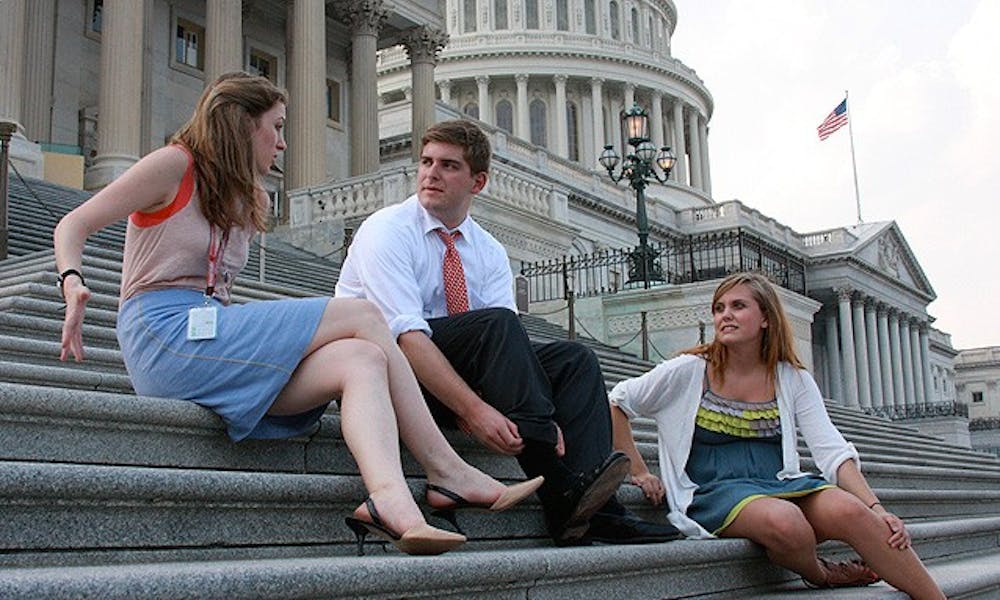In my experience, I’ve found Duke’s political culture lacking. Although the Duke College Republicans provided something for DSG to debate about last year and the Duke Political Union hosted some valuable panels Fall semester (don’t ask about the Spring), interest in politics comes and goes with each election cycle. Sarah Philips, a junior, speculates that Duke students don’t tend to be politically active “because people are just really busy, and because of the Duke bubble where you really have to make an effort to keep up to date on everything that’s going on.” Groups often host interesting speakers, but there’s a very small community of students who actively engage with local Durham politics, let alone those at the state-level or nationally.
It should come as a surprise to find, then, that there are more than 100 students in the Duke in DC Summer 2011 Facebook group (and probably more that don’t know it exists). Students are working for think tanks, nonprofits, lobbying and consulting firms, embassies and federal agencies. Indeed, more than 20,000 interns flood the Washington, D.C. area each summer.
Students who work for senators and congressmen face a whole separate set of experiences (though we all experience the joys of “non-renumerative” (unpaid) work).” A typical so-called “Hilltern” can expect to write briefings on hearings and topic points for speeches. Bridget Meaney, a sophomore interning for Senator Diane Feinstein of California, answers calls on constituents’ most pressing issues, including the hotly debated question of how to spell “Barack.” Another caller phoned the office before Harold Camping predicted the world would end to ask: “If the world ends, how are we supposed to get our social security benefits?”
Duke’s Hillterns were drawn to the city to be at the center of the nation’s decision-making process. John Lakso, a junior working for Senator Kay Bailey Hutchison of Texas, enthused: “I love attending committee hearings and being at the epicenter of the political process. It’s also cool to walk down the hall and see John McCain, John Kerry and all the big names!”

Melissa Miller, sophomore interning in California Congresswoman Loretta Sanchez’ office, said she was attracted to the opportunity to see the inner workings of Capitol Hill.
“I really don’t think I want a career in politics, but have always been interested in the mechanics of our government,” she added.
What’s more, Duke students are working across a broad political spectrum in DC. From Lakso, a “staunch libertarian,” to Miller, a “leaning conservative,” to Diane Shen, a sophomore and a self-proclaimed liberal, we present a mixed bag of political views. However, Philips argues, “Your views don’t matter too much when you’re filing mail, answering calls from constituents and running errands.”
Even though it’s an apolitical environment, I’ve found that working for the Canadian Embassy has enforced my own values and political views. However, for Harry Liberman, a junior working for the libertarian Institute for Humane Studies, his workplace has presented some ideological problems.
“Although I love the people I work with, I’ve found myself to be far too centrist to work with libertarians. The ideological dogma present in their beliefs oftentimes goes against what I think is common sense, or is even counter-factual,” Liberman said, adding that he has discovered that he’s less of a free-market libertarian than he thought he was.
Other forms of enlightenment come with exposure: “I never thought I’d switch from watching ‘The Biggest Loser’ to CSPAN!” Meaney said.
There are also surprising elements to working on the Hill. From the senator-only elevator (“If you end up in one, you’d better get out of there real quick,” said Philips) to the dealmaking that happens off of the Hill and with loopholes in the law, Duke Hillterns are getting to see how the sausage is actually made.
This presents a problem for some. Shen says her experience has made her feel jaded.
“This internship has cemented my unwillingness to go into politics. I think it’s important and I respect the people who work on the Hill, but it’s not for me. There is too much of a gray area in politics where I’m not sure if what I’m doing is necessarily morally right.”
There are other quirks to the system. Miller says that when the congresswoman goes back to her home office, the difference is like “night and day.” Dress codes, staffer attitudes, type of work and hours change, so “it’s more low key and relaxed when they’re back home.”
The summer flood of Hillterns produces a local backlash: to the delight of full-time staffers, websites such as dcinterns.blogspot.com chronicle interns’ inappropriate wardrobe choices, ignorant comments and public gaffes. Meanwhile, a new business in self-mockery and deprecation has sprung up in the form of Twitter accounts such as InternProblemz and Skintern.
No matter the perceived importance of Hillterns in D.C., our Duke representatives are having a transformative experience. As Shen said, “I love the knowledge that what I’m doing actually matters to someone, however small it may seem.” Hopefully, they will bring their newfound political enthusiasm back to campus.
Get The Chronicle straight to your inbox
Signup for our weekly newsletter. Cancel at any time.

